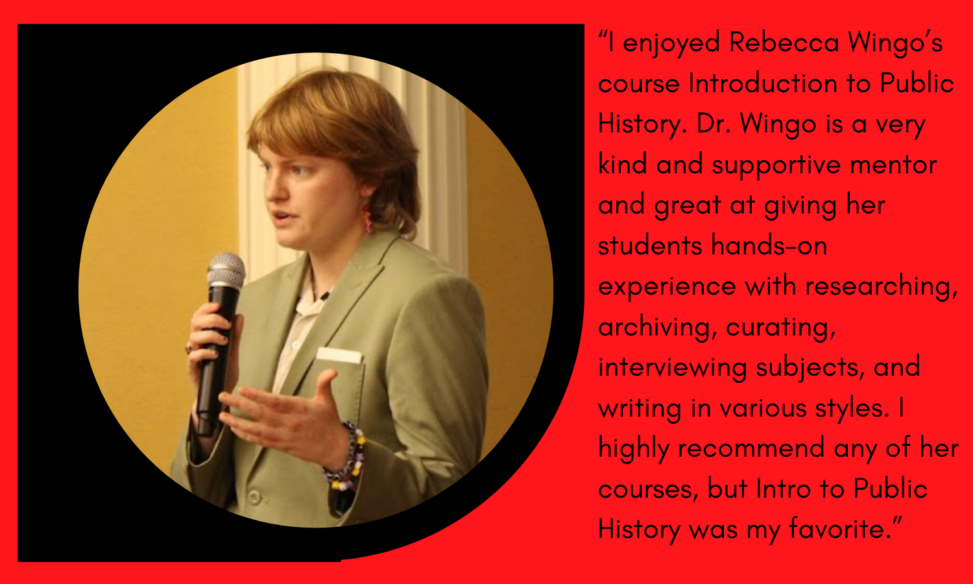I’ve lived near Cincinnati my whole life, being from Fairfield. I enjoy making art, exploring nature, cooking, and much more in my free time. In spring 2023, I was the recipient of a George Newberger Capstone Prize for my project, “Not Your Mother’s Birth Control: A History of Cincinnati’s Vasectomy Services, Inc.”, and I won a faculty-nominated Lenore F. McGrane Most Promising Student in History prize.
What are you up to these days?
I’m living in Cincinnati, patiently awaiting the start of grad school at UC this fall. I work at a bar in Walnut Hills, bussing and bartending, and I also volunteer for the Ohio Lesbian Archives, a physical archive dedicated to collecting and preserving LGBT history, with a focus on lesbian/feminist materials.
What brought you to history at UC?
I started at UC as a Political Science major. I found out pretty quickly, though, that the Poli Sci approach was not for me. Since I was interested in history during high school, I decided to go that route instead. I fell in love with the discipline as a whole, along with UC’s history department.
What did you focus on as a history student at UC?
I explored a bit of everything, although I chose to take mostly North American history courses. These courses typically covered topics from the 1800s onward.
Did you have any favorite history courses? Which ones and why?
I enjoyed Rebecca Wingo’s course Introduction to Public History. Dr. Wingo is a very kind and supportive mentor and great at giving her students hands-on experience with researching, archiving, curating, interviewing subjects, and writing in various styles. I highly recommend any of her courses, but Intro to Public History was my favorite.
What did you focus on in your capstone and why?
My capstone was titled “Not Your Mother’s Birth Control: A History of Cincinnati’s Vasectomy Services, Inc.” The paper explored a vasectomy clinic that was open in Cincinnati from 1970-1984 and provided thousands of free and reduced-cost vasectomies to Cincinnatians. I stumbled upon this topic when a professor I had taken a couple of classes with (Dr. Rebecca Wingo) emailed me about a man named Bert Heuther, one of the founders of VSI, who wanted the organization’s legacy preserved. I performed interviews, worked in Planned Parenthood of Cincinnati’s archive, and learned invaluable skills related to historical research and archiving.
What skills did you pick up from studying history that have served you well beyond your courses?
The skill I value most from my history study is the idea of historical perspective, which stresses the importance of examining people, events, actions, etc., in their historical context. At first, this mode of thinking emerged subconsciously, as I realized that people have ALWAYS been people (at least, in the scope of history I study), and technology, language, values, and resources are more accessible during their lifetime to inform their thoughts and behavior. Now, I can consciously ask myself if I am judging a historical figure or event as a modern observer or if I am properly looking at it through the proper context. Some things make much more sense when you can identify how factors in their environment affect them.
Have any advice for current students?
Talk to your professors. In my mind, this is the most important advice I can offer. I don’t just mean “email them and ask them for an extension or help on a project,” although you should reach out when you need help. I am also saying: talk to them! Stay after class on a day you enjoyed and chat about the topic. Ask them about a current project they’re working on. View your professors not as people trying to judge you or give you a hard time but as people in the same field with much more knowledge and experience who want to see you succeed! The relationships I formed with various professors at UC provided me with a support network full of professional contacts.

1 Comment
1 Pingback